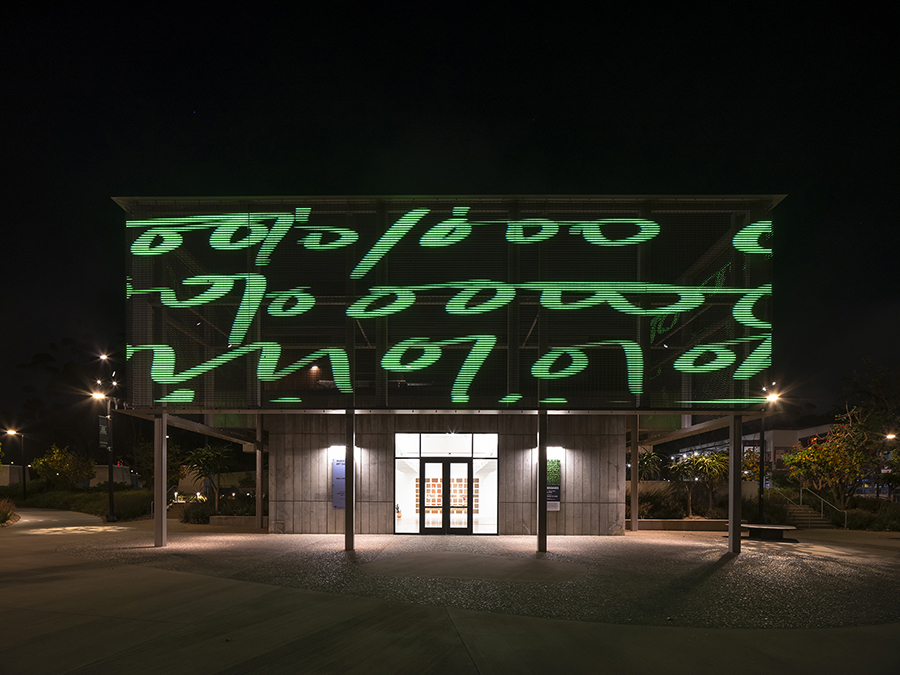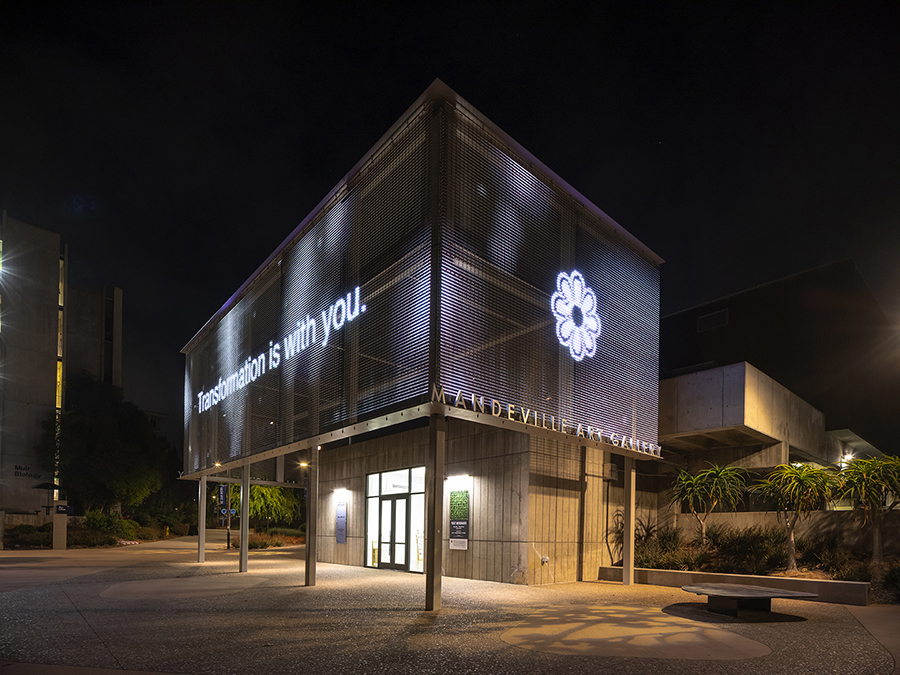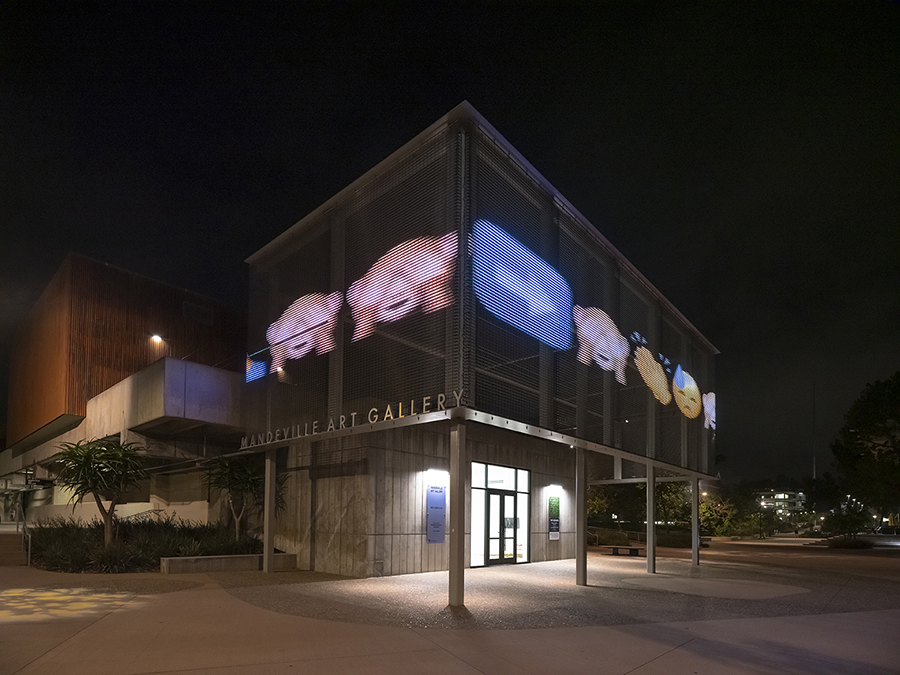Text Messages
July 1-September 27, 2025
Text Messages is a program presented on the Mandeville Art Gallery’s exterior screen, comprised of works by digital artists displaying text manipulated and hijacked using programming and code. The words, phrases, and typography presented on view reveal the influence of machines on the production of meaning and the exercise of power within the context of social media, advertising, online censorship, and artificial intelligence.
Text Messages is on view daily from 7 am to 10 pm. All the works have been commissioned or specifically adapted for the exhibition.
Participating Artists:
Maya Man, Winnie Soon, Sasha Stiles
Curated by Ceci Moss, Director and Chief Curator of the Mandeville Art Gallery and Professor of Practice, Visual Arts
Image carousel: Text Messages, Installation Views, Mandeville Art Gallery, July 1-September 27, 2025 (Photos by Pablo Mason)
Homepage image: Sasha Stiles, CURSIVE BINARY: FRAGMENT 1B, 2021
AI-powered poetry translated into Cursive Binary, a proposed language for human-machine collaboration.
Courtesy the artist.
Text Messages is made possible by Teiger Foundation

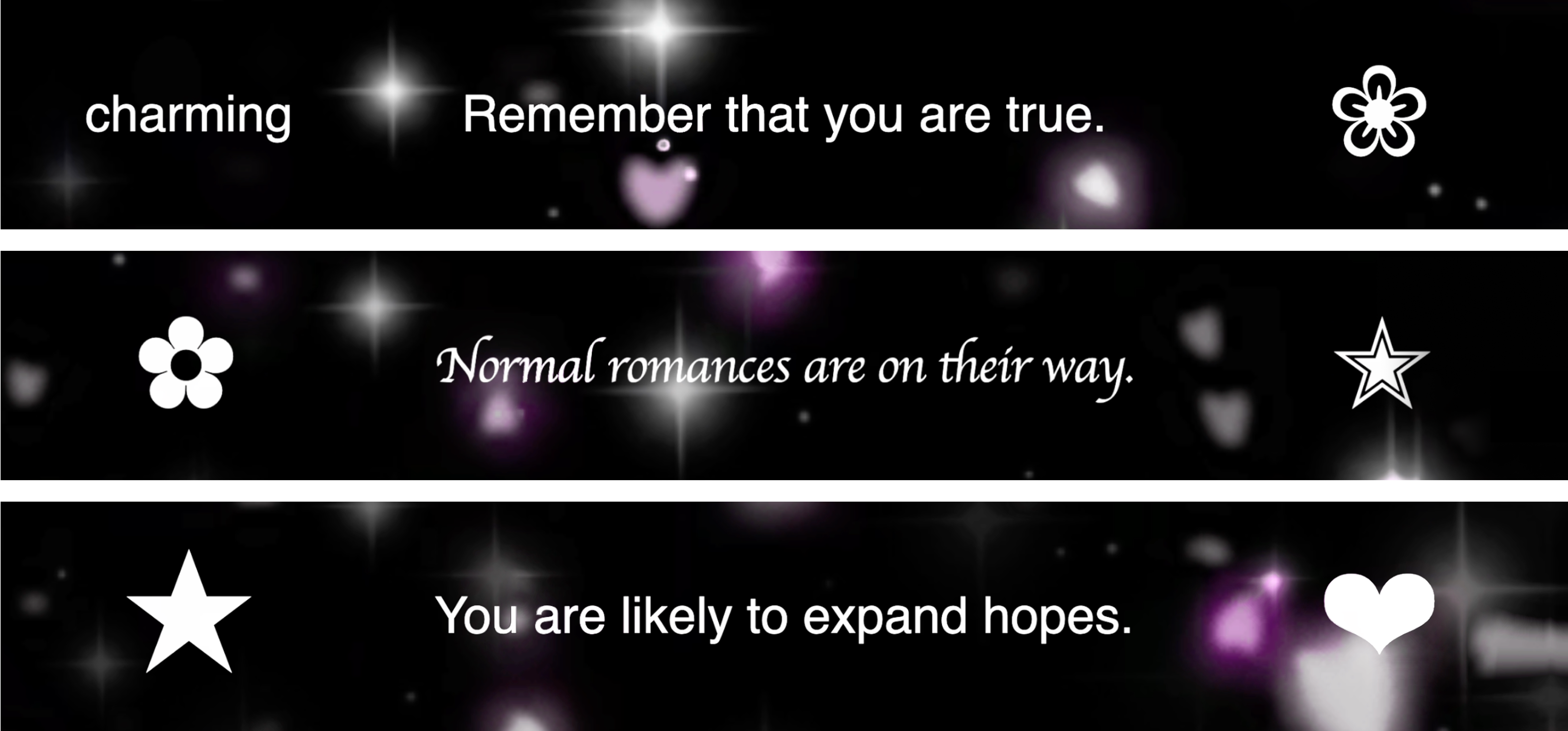
Maya Man, I'm Feeling Lucky (At a Glance), 2025
Digital video (color, silent): Custom generative software, digital effects,
Six videos, each 10 minutes, shuffled on loop
Coded by the artist, I’m Feeling Lucky (At a Glance) generates randomized astrological “readings” from a database of words and phrases sourced from vintage astrology books, horoscope websites, and apps like Co–Star and The Pattern. (The subtitle At a Glance refers to the homepage screen of the Co–Star app.) In a world increasingly influenced by pervasive optimization, the project invites viewers to assign personal significance—and a sense of agency regarding their future—to predictions generated by algorithms.
Maya Man is an artist focused on contemporary identity culture on the internet. Her websites, generative series, and installations examine dominant narratives around femininity, authenticity, and the performance of self online. She is the creator of the browser extension Glance Back and the Art Blocks curated collection FAKE IT TILL YOU MAKE IT. She has exhibited internationally at the Whitney Museum of American Art, NYC; bitforms, NYC; SOOT, Tokyo; Verse, London; HEK, Basel; and Feral File, online. She has been invited to speak on her work at The New Museum, NYC; The V&A, London; and MOCA, Los Angeles. Her artwork has been featured in Art in America, Document, Vogue, and Dazed among other publications. She currently runs a DIY space out of her studio in Soho called HEART.
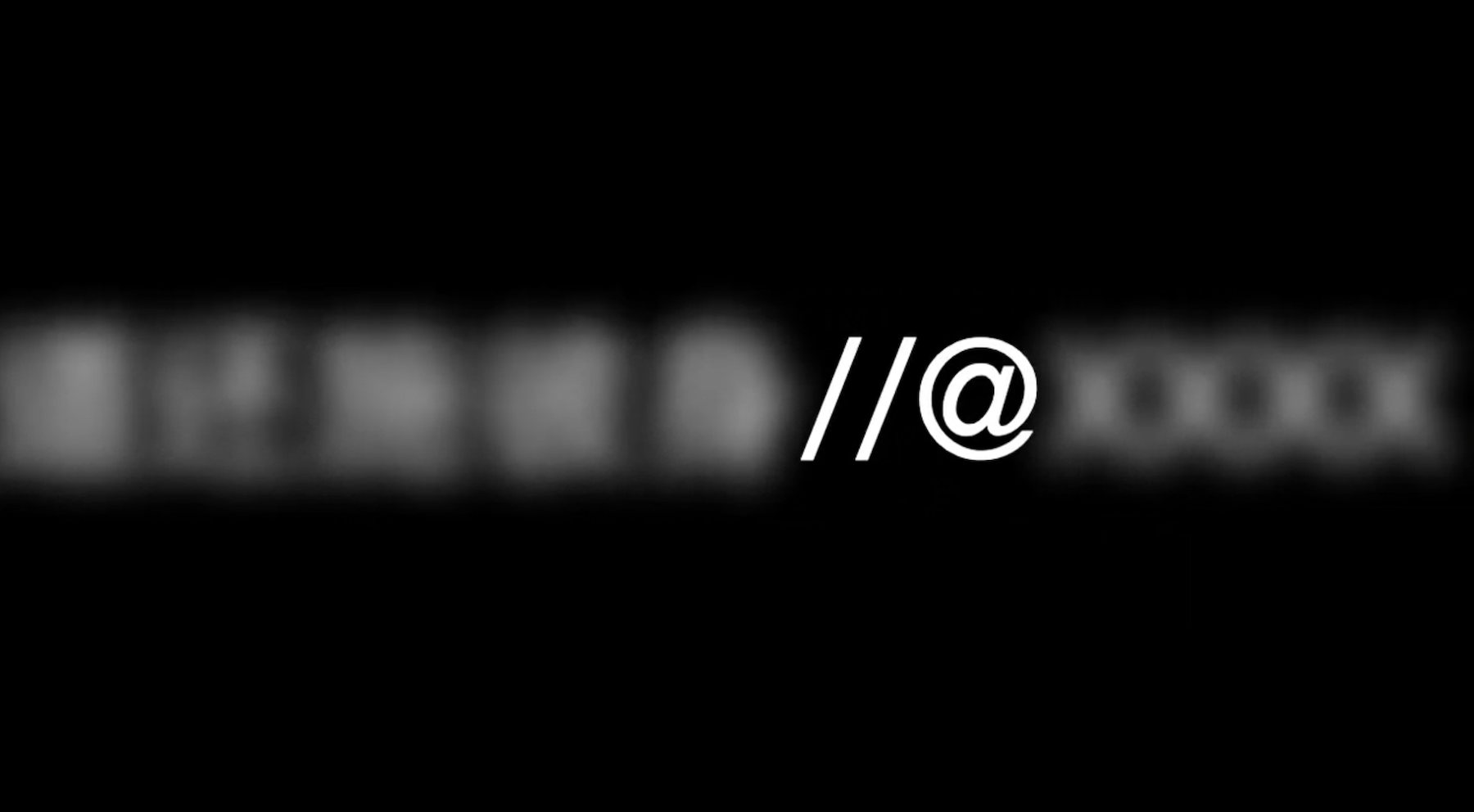
Winnie Soon, Unerasable Characters III / 別不了的符號 III, 2020–Ongoing
Traces of found data in marquee-style scrolling, crafted beyond HTML as generative drifting
The Unerasable Characters series examines censorship in the context of digital authoritarianism, critically engaging with the dynamics of desire, silence, and erasure. The series draws on censored and erased data from China’s Weibo social media platform, based on a research initiative led by Dr. Fu King-wa at the University of Hong Kong. The project systematically samples the timelines of selected Chinese microbloggers — particularly those with more than 1,000 followers or whose posts are frequently targeted for censorship.
Unerasable Characters III uses a dataset spanning from December 1, 2019, to February 27, 2020 — the early stages of the COVID-19 outbreak in China. According to Fu King-wa and Yuner Zhu, 11,362,502 posts were made during this period, of which 1,230,353 contained at least one outbreak-related keyword. Among these, 2,104 posts (approximately 1.7 per 1,000) were censored. The artwork presents this erased archive: each censored Weibo post is rendered unreadable, with its textual content obscured or blacked out — leaving only punctuation, emojis, and special characters visible.
Winnie Soon is a Hong Kong-born artist coder and researcher interested in the cultural implications of digital infrastructure that addresses wider power asymmetries with a particular interest in computational publishing, code and software. Their artistic and scholarly works engage with themes such as Free and Open Source Culture, Coding Otherwise, artistic/technical manuals, digital censorship and minor technology. With works appearing in museums, galleries, festivals, distributed networks, papers and alternative written forms, including co-authored books titled Boundary Images (2023), Fix My Code (2021), and Aesthetic Programming (2020), Winnie is also the co-editor of the Software Studies Book Series (MIT Press) and a board member of UCL Press and Publications.
Artistically, Winnie has received awards including the Golden Nica at Ars Electronica, the Expanded Media Award for Network Culture at Stuttgarter Filmwinter, and others. They are currently Associate Professor of Art and Technology at UCL's Slade School of Fine Art and visiting researcher at the Centre for the Study of the Networked Image (CSNI), London South Bank University.
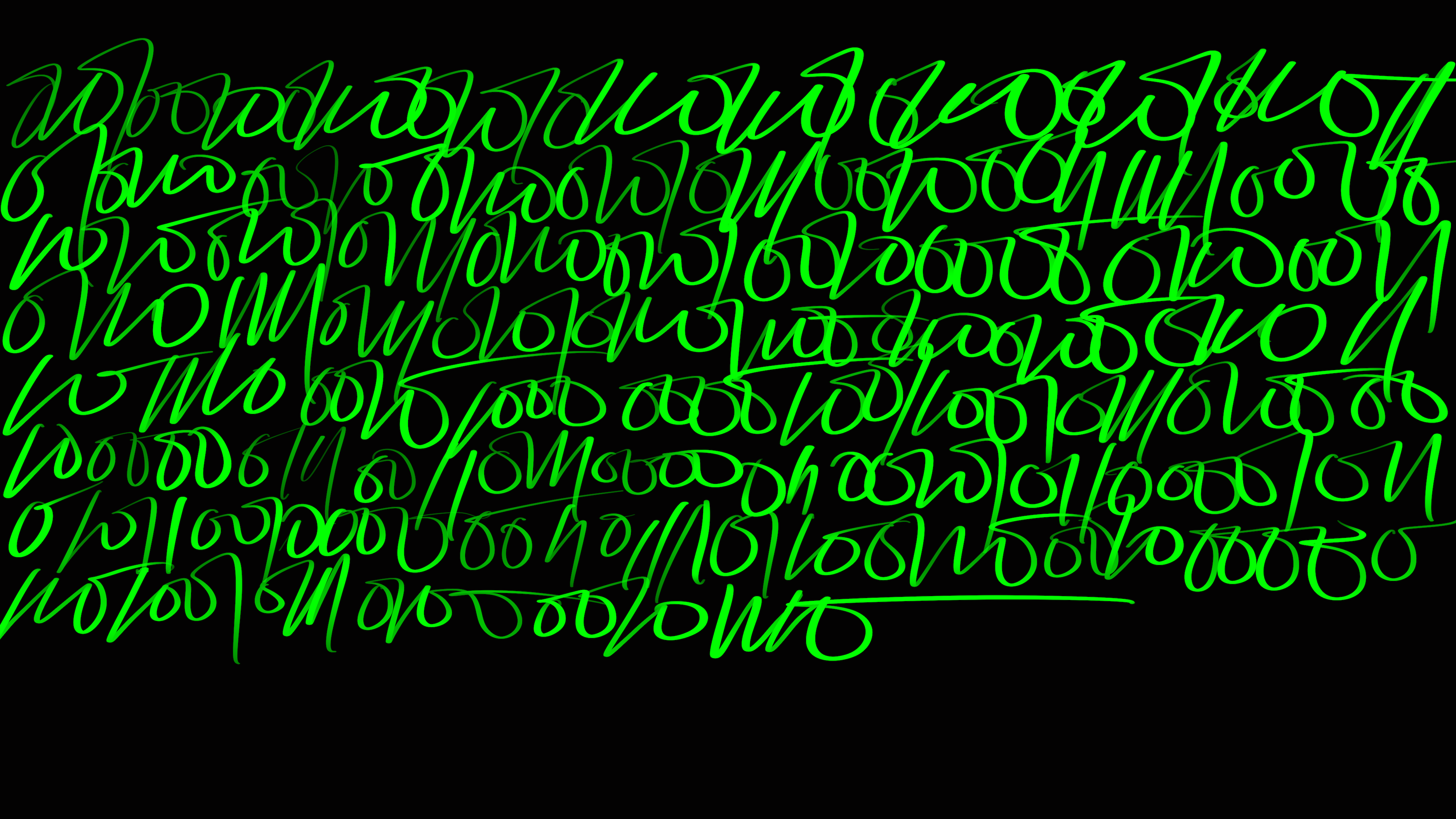
Sasha Stiles, Cursive Binary, 2021–Ongoing
AI-powered poetry translated into Cursive Binary, a proposed language for human-machine collaboration. Courtesy the artist.
Artist and poet Sasha Stiles describes Cursive Binary as a “proposed language for transhuman understanding” that operates as a “a poetic metaphor for the entwining processes, qualities and outcomes of human-machine collaboration.” The work’s texts were generated using Technelegy, a custom AI language model developed in 2018 and trained on over a decade of Stiles’ analog poetry—predating the advent of mainstream generative tools like ChatGPT. These texts were translated into binary sequences of 0s and 1s and then inscribed in a transhuman typeface based on the artist’s own handwriting. The work merges the fluidity of cursive human script with the precision of binary code, rendered in chroma-key green to further enhance digital legibility.
Sasha Stiles is a first-generation Kalmyk-American poet, language artist, and AI researcher working at the nexus of text and technology, known for her pioneering experiments with generative literature and blockchain poetics. Her practice refracts heritage and tradition through disruptive explorations of creativity and consciousness, probing the role of human voice in a machine age. She released her debut book, Technelegy, in 2021, and is the founder of theVERSEverse, a writers collective and web3 literary gallery. Stiles’ work has been recognized by the Prix Ars Electronica, Lumen Prize, and others, and presented at major global venues and institutions.
